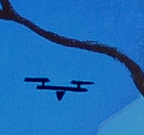Does Trust Have a Future?
Much of human progress has been driven by the evolution of trust. Will that continue? How will technology change trust, society and collective action?
In my two #scifi novels Utopia Five and the newly published Conundra I look at the potential effects of vastly enhanced, publicly-available surveillance on society and trust. Would it be dystopian or utopian?
Trust 1.0
There was a time in history when the only people you could trust were members of your own family. Groups that widened this circle along, say, ethnic or religious lines (let’s call it Trust 2.0) gained a huge economic advantage — they could do business with far more people. For example, they could extend credit knowing their tight-knit society would punish those who failed to repay debts.
Eventually, the rest of the developed world wised up to the benefits of more trust. The legal and banking systems took on responsibility for behavioural enforcement and suddenly everyone could sign contracts or exchange loans with a lot less risk. Trust 3.0 thus became about the power of the state to enforce “trustworthy” behaviour.
In the developing world, institutional trust systems (e.g. banks) and enforcement (e.g. courts) are seen as fundamental to a successful economy and the escape from poverty. Read the excellent “Poor Economics” for a well-argued book on that subject.
So, trust has evolved beyond interpersonal judgments based on close familiarity to trusted authorities and enforcement based on state-defined legal rules.
Which way will it go next?
Overrated?
Technology has revolutionized the concept of interpersonal trust by introducing public ratings and reviews. When we’re buying something from an unknown vendor on Amazon, Ebay or Etsy, reviews from other customers give us a new kind of familiarity — one based on the collective experience of a bunch of complete strangers. As long as there are enough of them and the system isn’t too crooked that works pretty well. Uber and AirBnB have even made it a two-way street by letting sellers review customers as well as vice-versa.
Don’t Lie to me!
The EU recently announced the trial of an AI to detect if someone is lying at border control. I suspect they should try it first on the person who sold them that system but in the future it’s possible we will be able to work out who to trust based on facial or voice analysis. How might that change us?
The Eyes Have it
For nearly a decade, China has been building a vast surveillance system that combines observation by the state with private company data to produce public social scores that can have far-reaching effects on the lives of citizens.
Dystopian or what? Why do Chinese citizens put up with it? As usual, the reality is not quite as black and white as it sounds. In many cases, the observation is popular. Many folk find it useful to know who they can trust — particularly in China’s new cities where strangers are required to cooperate every day or where people with no credit history or local contacts need loans or help.
On the downside, the fear of that level of state intrusion is one of the causes behind the current unrest in Hong Kong. There, the populace often have different priorities to mainlanders.
Slave to the Algorithm
Taking a very different approach to Amazon customers, China, or the EU, blockchain wants to deliver a future where trust is no longer required. The most common use of blockchain, in crypocurrencies, is popular with criminals and radical libertarians. Greener humans, however, hate the appalling carbon footprint — trust is expensive to replace.
Trust in the Future
What will the next generation of trust look like? Will we enhance interpersonal judgment though better data, brain-scanning or lie-detecting AIs? Or will we remove the need for individual human judgment by extending state powers or by using tech like blockchain?
My personal conclusion is that trust might be the most powerful tool humanity has. Is it worth evolving and expanding it any cost? It could be.
About the Author
As well as being an engineer for 25 years, Anne Currie is the author of a series of science fiction action and adventure novels that explore AI, surveillance, climate change and new forms of society.
Panopticon Series
- Book 1: Utopia Five
- Book 2: Conundra
- Book 3: Denizen 43
“Utopia 5 asks the big questions about privacy, surveillance and free will in a networked society. All wrapped up in a page-turning thriller” — Buy it on Amazon
Hero image with thanks to NASA.
